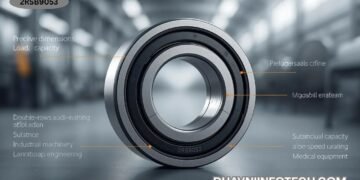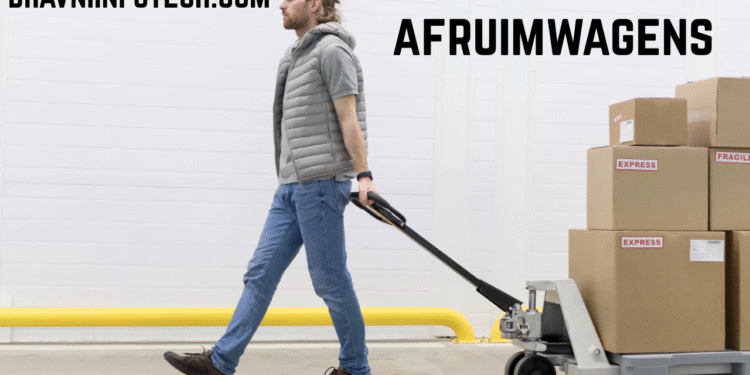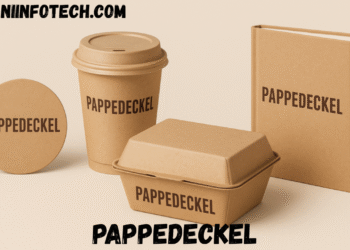Afruimwagens are indispensable tools in modern cleaning and waste management systems, offering an efficient way to collect, transport, and dispose of various types of waste or materials. The term afruimwagens refers to specialized carts or trolleys designed to simplify the process of clearing away waste, debris, dishes, or materials in professional environments such as hotels, hospitals, restaurants, factories, and warehouses. They are a cornerstone of organized, hygienic, and efficient cleaning systems, helping staff handle large volumes of waste without frequent trips. Afruimwagens are made from durable materials like stainless steel, aluminum, or industrial-grade plastic, which ensures strength, hygiene, and longevity. Their use not only reduces physical strain on workers but also streamlines waste handling and promotes a cleaner, more professional environment. From food service areas to industrial plants, afruimwagens improve workflow and maintain high standards of cleanliness and safety throughout various operations.
Afruimwagens are especially important in busy facilities where cleanliness and organization must be maintained continuously. Their strong yet maneuverable design allows users to move them easily even in tight spaces such as hallways or crowded kitchens. By integrating afruimwagens into daily operations, organizations can ensure that waste is managed efficiently and that hygiene standards remain consistent across all work areas. They are available in multiple configurations, allowing businesses to choose the type that fits their specific requirements.
The Design and Construction of Afruimwagens

The structure of afruimwagens is meticulously crafted to ensure durability, maneuverability, and user comfort. Most afruimwagens feature a strong frame capable of withstanding heavy use, with swivel wheels for smooth movement and stability on different floor types. The main body is often constructed from stainless steel or high-density polyethylene to resist corrosion, moisture, and harsh cleaning agents. The design prioritizes hygiene, allowing easy cleaning and sanitization after use. Many afruimwagens also include removable bins or containers to separate waste types, such as organic materials, recyclables, or general trash. This separation system promotes eco-friendly waste management and simplifies sorting.
In addition to functional structure, afruimwagens are designed with ergonomic features to reduce user fatigue. Adjustable handles, noise-reducing wheels, and sealed compartments are often included for user comfort and operational efficiency. Some advanced models include locking mechanisms for secure waste containment, ensuring that no odor or contamination escapes. The combination of smart design and practical engineering makes afruimwagens reliable assets in any professional setting, where durability, hygiene, and ease of movement are vital.
Different Types of Afruimwagens for Varied Applications
There are several types of afruimwagens designed for specific industries and tasks, each tailored to meet unique operational requirements. Cleaning afruimwagens are commonly used by janitorial and housekeeping teams to carry cleaning supplies, detergents, and tools alongside waste bins, allowing for all-in-one maintenance. Catering afruimwagens are designed for the hospitality industry, especially in hotels and restaurants, to collect dishes, glasses, and food waste efficiently. Industrial afruimwagens, on the other hand, are larger and more robust, built to transport heavy waste, debris, or raw materials across manufacturing plants or warehouses.
Hospital afruimwagens are another critical category, developed with strict hygiene and safety considerations. They feature closed compartments and are made from materials that resist bacteria, making them ideal for handling medical waste safely. Outdoor afruimwagens are built with weather-resistant materials and heavy-duty tires, making them suitable for use in parks, event spaces, or construction sites. Each of these types serves a crucial role in maintaining cleanliness, order, and operational efficiency across various industries.
Key Benefits and Advantages of Using Afruimwagens
Afruimwagens bring numerous benefits that make them essential in workplaces requiring constant cleaning and waste removal. One of the most significant advantages is increased productivity. Staff members can transport larger volumes of waste or materials in fewer trips, saving time and effort. This efficiency leads to a cleaner and more organized environment. Another benefit is improved hygiene and safety, as afruimwagens are designed to contain waste securely, preventing leaks, odors, and contamination. Their ergonomic construction also reduces the physical strain associated with lifting or carrying heavy loads manually.
Furthermore, afruimwagens contribute to sustainability by supporting waste segregation and recycling initiatives. Many models include compartments for different waste types, allowing staff to sort materials at the source. This helps organizations meet environmental goals and regulatory standards. The mobility and durability of afruimwagens make them cost-effective investments, as they require minimal maintenance and have a long service life even in demanding conditions. Their versatility and practicality make them suitable for use in almost every commercial and industrial setting.
Afruimwagens in the Hospitality and Food Service Industry

In the hospitality and food service sectors, afruimwagens play an essential role in maintaining cleanliness, efficiency, and hygiene. Restaurants, hotels, and catering services rely on afruimwagens to clear tables, transport dirty dishes, and dispose of food waste efficiently. This ensures faster turnaround times and maintains a pleasant environment for guests. Afruimwagens in this industry are often designed with elegant finishes and easy maneuverability to blend into the professional setting while still being highly functional.
In hotel housekeeping departments, afruimwagens are used for collecting used linens, towels, and waste while distributing fresh supplies. Their design allows housekeepers to organize cleaning materials neatly, minimizing time spent moving between rooms. The quiet, smooth wheels ensure that afruimwagens move silently through hallways, maintaining a calm and professional atmosphere. Overall, these trolleys enhance operational speed and quality in environments where customer satisfaction and hygiene are top priorities.
Industrial and Commercial Applications of Afruimwagens
In industrial and commercial settings, afruimwagens are critical for maintaining efficient waste handling and workplace organization. Factories, warehouses, and production lines often generate large amounts of waste materials, packaging, or by-products that need to be managed quickly and safely. Industrial afruimwagens are designed to handle heavy-duty tasks, with reinforced frames and high load capacities. They are ideal for moving both waste and materials between different sections of a facility.
In commercial buildings, such as shopping centers or office complexes, afruimwagens are used by maintenance teams to ensure that waste bins are emptied regularly and that cleaning tools are always accessible. Their mobility allows workers to cover large areas quickly and efficiently. By using afruimwagens, organizations can maintain cleaner environments while reducing manual workload and improving the overall workflow within their facilities.
Features That Define Modern Afruimwagens
Modern afruimwagens are developed with user convenience, efficiency, and hygiene in mind. Many models come with modular designs, allowing customization based on specific needs. For example, users can add extra compartments, adjustable shelving, or detachable bins depending on their daily tasks. The inclusion of easy-grip handles, rubberized wheels, and anti-tip construction enhances both safety and control. Some modern versions also include labeling systems to identify waste categories clearly, promoting recycling and proper disposal practices.
Noise reduction is another important feature, especially in hospitals, offices, and hotels where maintaining a quiet environment is essential. The materials used in modern afruimwagens are resistant to corrosion, scratches, and harsh cleaning chemicals, ensuring long-lasting use. These advancements highlight how afruimwagens have evolved from simple trolleys into essential professional tools for cleanliness, organization, and sustainability.
Maintenance and Care for Long-Lasting Afruimwagens

Proper maintenance is crucial to ensure the longevity and reliability of afruimwagens. Regular cleaning prevents contamination and extends the life of materials such as metal and plastic components. Users should inspect wheels, joints, and handles frequently to ensure smooth movement and stability. Any removable parts, such as bins or trays, should be washed and sanitized regularly to prevent buildup of bacteria or unpleasant odors.
Lubricating moving parts like wheel axles and hinges can help maintain flexibility and ease of motion. It is also advisable to store afruimwagens in dry areas when not in use to avoid corrosion or wear. By implementing a consistent maintenance routine, organizations can ensure that their afruimwagens remain functional, hygienic, and efficient for years of service, reducing replacement costs and improving operational dependability.
Safety Considerations When Using Afruimwagens
Safety is a vital factor when using afruimwagens in professional environments. Overloading the cart should be avoided to prevent tipping and ensure stability. Workers should be trained on correct handling techniques, such as pushing rather than pulling the afruimwagen, to reduce strain and prevent accidents. Proper waste segregation is also important to avoid exposure to hazardous materials. Closed-lid afruimwagens are recommended in medical and food-related settings to prevent contamination and control odors.
Furthermore, ensuring that wheels are well-maintained and the floor surfaces are clear of obstacles will reduce the risk of slipping or collisions. Implementing safety guidelines for the use of afruimwagens contributes to a secure workplace environment and promotes responsible waste handling practices among staff members.
Conclusion
Afruimwagens represent efficiency, cleanliness, and reliability across multiple industries. Their ability to simplify waste handling, enhance hygiene, and improve productivity makes them indispensable tools in modern operations. Whether in hospitality, healthcare, industry, or public spaces, afruimwagens offer a practical solution for organized and sustainable waste management. Their designs continue to evolve, incorporating new materials and features that meet the growing demand for cleaner, safer, and more efficient working environments.
FAQs
1. What are afruimwagens used for?
Afruimwagens are used for collecting, transporting, and disposing of waste or materials efficiently in professional environments.
2. Where are afruimwagens most commonly used?
They are used in hotels, restaurants, hospitals, factories, and warehouses where large-scale cleaning and waste collection are needed.
3. What materials are afruimwagens made from?
They are typically made from stainless steel, aluminum, or industrial-grade plastic for durability and hygiene.
4. How do afruimwagens improve efficiency?
Afruimwagens allow workers to transport larger loads in fewer trips, reducing manual effort and increasing productivity.
5. Why are afruimwagens important in modern industries?
They support hygiene, safety, sustainability, and operational efficiency, making them vital to professional cleaning and waste management systems.
Read More: The Evolution Design and Importance of sqrwomensrestroom in Modern Spaces

























